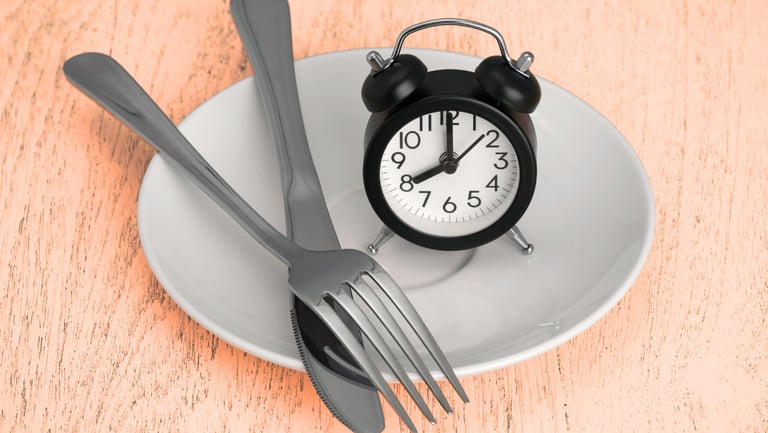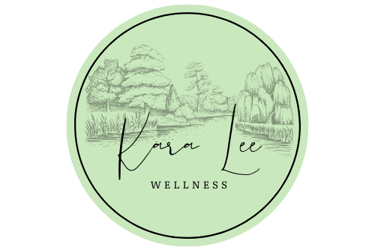Is Intermittent Fasting Really Worth the Hype? What Science (and Your Body) Say
Discover the benefits of intermittent fasting for women, including its impact on weight loss, energy levels, and blood sugar balance. Learn why intermittent fasting may be a game-changer and whether it's the right choice for you.
HEALTH AND WELLNESSHORMONE HEALTHBALANCED DIETINTERMITTENT FASTING


Intermittent fasting is one of the hottest topics in the world of nutrition right now. I talk about it with clients at least weekly—if not daily—and I know many of you are curious too. So, let’s dive into what intermittent fasting actually is, why it’s so popular, and whether I recommend it (especially for women).
What Exactly Is Intermittent Fasting?
Fasting itself isn’t new—it’s been part of religious, cultural, and even medical practices for centuries. What is new is the modern trend of intermittent fasting, which has gained mainstream popularity over the past 10–15 years.
In simple terms, intermittent fasting involves cycling between periods of eating and not eating. Some people fast for one or two full days per week and eat normally the rest of the time, while others fast daily for 12–16 hours and eat during an 8–12 hour window. The idea is that this pattern may help reduce calorie intake, lower inflammation, and improve blood sugar control (often measured by hemoglobin A1c levels).
On the surface, it sounds harmless—maybe even beneficial. Studies have shown potential improvements in blood sugar, weight, and even blood pressure. So… what’s the catch?
What the Research Really Says
Here’s the first red flag: most of the research on intermittent fasting has been done on men. And as we’re thankfully beginning to acknowledge, men and women are biologically and hormonally very different. What works well for one doesn’t always work for the other.
Even when women are included in studies, the sample sizes tend to be small, and other confounding factors—like changes in light exposure, sleep, or exercise—can influence results. It’s also difficult to separate whether the benefits come from fasting itself or from the weight loss and cleaner eating that often accompany it.
Why Intermittent Fasting Can Backfire for Many Women
Yes, studies show short-term benefits, and many people say they feel more energized or “clear-headed” while fasting. But the bigger question is: what state is your body in when you start fasting?
Most of the women I work with are busy, overextended, and often running on fumes—stressed, depleted, and trying to do all the right things but still not feeling great. Fasting, while trendy, is actually a stressor on the body—just like intense workouts, cold plunges, or saunas. These stressors can be beneficial if your body is well-nourished and resilient. But when stress is already high, adding another layer (like not eating) can do more harm than good.
When your body feels unsafe or under stress, its priority isn’t weight loss—it’s survival. Restricting food in that state can actually make it harder to lose weight, regulate hormones, or feel balanced. The only group of women who may see some benefit from fasting are those in menopause, when hormones have already stabilized at lower levels—but even then, it needs to be done carefully and individually.
The Hormonal Connection
For women who are menstruating, intermittent fasting often does more harm than good. It can disrupt hormones like cortisol and insulin, which play key roles in energy, mood, and weight regulation. It’s also not recommended during pregnancy or breastfeeding, when the body’s nutritional demands are higher.
Women’s hormones run on their own rhythm and require steady nourishment to function well. Most women today are already low in key vitamins and minerals, so further restricting intake can make things worse. While some short-term benefits may appear, the long-term impact—especially on hormones and metabolism—hasn’t been clearly established.
Why You Might Feel Better at First
If you’ve tried intermittent fasting and initially felt great, you’re not imagining it. You may have started eating cleaner, reduced late-night snacking, or become more mindful about your meals—all positive changes. But those improvements can often be achieved without fasting.
Going long stretches without eating can make it harder to replenish nutrients, balance blood sugar, and support stable hormones—especially for busy women juggling stress, family, and work.
What I Recommend Instead
Instead of focusing on when you eat, I encourage women to focus on how and what they eat, and how well their body feels supported. My general recommendations include:
Eating within 30–60 minutes of waking
Having balanced meals and snacks with protein, healthy fats, and carbohydrates
Avoiding going more than 4 hours without eating
Limiting late-night snacking
Prioritizing whole, real foods
Slowing down while eating—actually chew and enjoy your food
Supporting your body by addressing underlying stressors (like infections, toxins, or inflammation)
Rebuilding mineral and nutrient stores
Ultimately, it’s about nourishing your body and creating an internal environment where it feels safe to thrive. From there, weight loss, steady energy, and hormonal balance often follow naturally.
If someone really wants to experiment with fasting, I typically recommend a gentle 12-hour overnight fast—say, finishing dinner at 7 PM and having breakfast around 7 AM. This supports healthy digestion and reduces nighttime snacking without adding unnecessary stress.
My Final Thoughts
Intermittent fasting can be a useful tool in specific cases—particularly for men—but it’s rarely my first recommendation for women. Until more research is done, and unless a woman’s body is in a strong, balanced state, fasting often does more harm than good.
If you’re curious about what might work best for your body, or you’ve been struggling with fatigue, stress, or hormone fluctuations, please reach out. I’d love to help you find a rhythm that truly supports your health—without depriving your body of the nourishment it needs.
And if you love to “nerd out” on research like I do, I’ve included a few studies/articles below for your own deep dive. 😊
https://clinicaltrials.gov/study/NCT04155619
https://pubmed.ncbi.nlm.nih.gov/29754952/
https://health.clevelandclinic.org/intermittent-fasting-for-women
This post was written by Kara and edited with AI.


